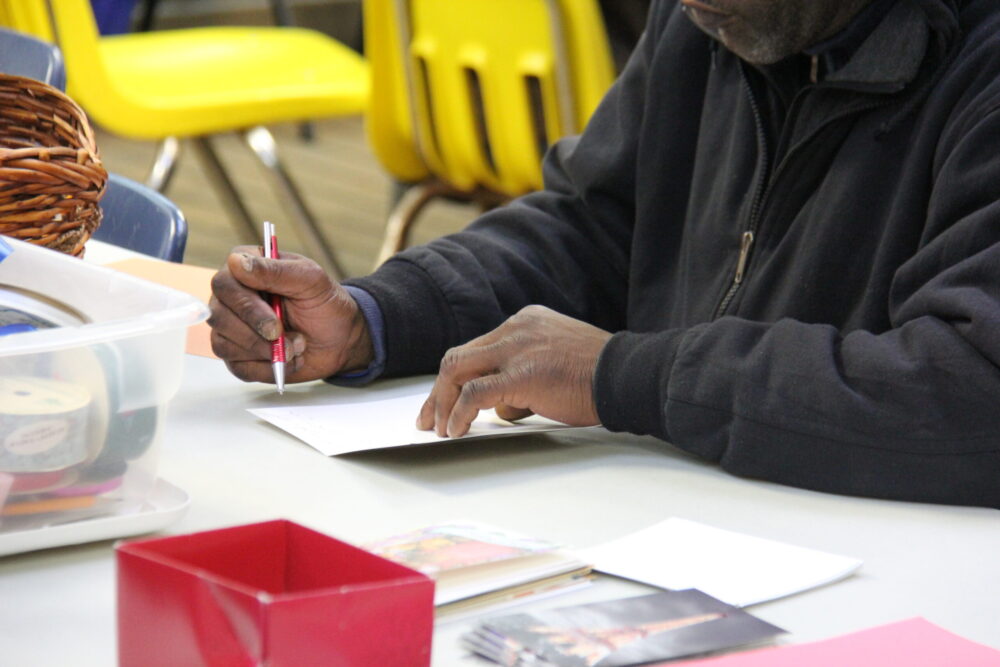Advocacy
Advocacy
SOME’s comprehensive approach to addressing homelessness and poverty includes more than the direct services we provide to the individuals and families who come to us for help.
- We advocate for policies and programs that will better serve the needs of all experiencing homelessness and extreme poverty in DC and those at risk of homelessness.
- We seek changes that will eliminate the root causes of homelessness and poverty.
- We strive to empower our residents, students, clients, and other community members that are affected by homelessness and poverty to speak out for their interests and play an intricate role in our policy and advocacy work.
- We foster an active commitment to social justice by educating public officials, our volunteers, faith-based and community organizations, and schools.
SOME partners with many other organizations to develop and advocate for the best feasible solutions. We also enlist concerned citizens to voice their support through our grassroots SOME Advocacy Network.
Homelessness in Washington, DC
Almost one in seven DC residents – one in four DC children – live at or below the poverty line. More than 94,000 people in Washington live in extreme poverty, unable to meet even their basic needs.
Each year, these data are collected during D.C.’s Homelessness Enumeration, informally known as the Point-in-Time (PIT) Count. PIT data are used locally to plan programs, allocate funding, track progress toward goals outlined in the District’s Homeless Services Plan called Homeward DC 2.0, and better meet the needs of our homeless neighbors. You can find D.C.’s comprehensive data here, and you can locate the report for the entire D.C. Metro region here. You can find the District’s Homeward DC 2.0 Plan here.
42%
of unhoused adults in families were employed but cannot afford housing.
28%
reported severe mental illness.
27%
reported domestic violence history including many who were homeless directly because of domestic abuse.
17%
of unaccompanied adults reported chronic substance abuse.
15%
reported chronic health problems.
13%
reported physical disabilities.
12.1%
reported both chronic substance abuse and severe mental illness.
Key Programs and Policy Tools
SOME encourages the support of certain programs and policies that aim to improve the current condition of homelessness. These include: tools for building and preserving affordable housing, income supports, and mental health and substance abuse treatment. We advocate for access to affordable and nutritious food, senior services, family and domestic abuse services, homelessness prevention, informed regional transportation planning, workforce development, and more.
We encourage community organizations of all kinds to participate with us in speaking out for these programs and policies.
Our Successes
In the past 15 years, with support from SOME’s residents and Advocacy Network along with coalition partners, SOME succeeded in getting increased funding into the District budget and policy changes for several important citywide programs.
- Inclusionary Zoning -- incentives for developers to include affordable units.
- Housing Production Trust Fund (HPTF) provides capital dollars for investment in land/buildings, preservation or reconstruction. We succeeded in increasing this resource from $14M to nearly $500M/year.
- Local Rent Supplement Program-- provides operating subsidies and tenant-based vouchers. Interim Disability Assistance -- while disabled applicants wait for Federal determinations of their SSI/SSDI applications
- Homeless Services Reform Act, increased funding for Permanent Supportive Housing, Targeted Affordable Housing, other tools for chronically homeless persons
- Nongovernmental partnerships, education and outreach-- Project Homeless Connect annual service fair, coordinated by United Way of the National Capital Area, Coalition of Housing and Homeless Organizations (COHHO), Coalition for Nonprofit Housing & Economic Development
- Effectively financed the Career Pathways Innovation Fund, enabling individuals to learn industry skills while building basic literacy, math, and employment skills.
- Added nearly $16 million to the DC Housing Production Trust Fund, $11.5 million for the Affordable Housing Preservation Fund, and $12 million for Workforce housing tax abatements.
- Secured over $6 million for transitional housing for families and single adults.
- Stabilized funding for the Substance Use Disorder (SUD) Mobile Crisis Response Program.
- Achieved $8 million for Housing Counseling Services that are essential to helping renters know their rights, retain their housing, and become homeowners.
- Engaged in comprehensive plan to improve conditions in emergency shelters.
- Ensured funding to develop a 10-year all-inclusive strategic plan for the aging population in DC. A new senior wellness facility which broke ground in 2020.
- Increased funding to continue homeless outreach services that totaled over $3.5m, previously funded by federal grants.
Resources and Tools

